
Cambridge University Press
978-1-009-15192-4 Think Starter Student's Book with Interactive eBook
Herbert Puchta
Table of Contents
More Information


Cambridge University Press
978-1-009-15192-4 Think Starter Student's Book with Interactive eBook
Herbert Puchta
Table of Contents
More Information
Welcome p 4 The alphabet; Colours; International words Articles: a and an; The day; Saying Hello and Goodbye Classroom objects; Numbers 0–20; Plural nouns; Classroom language Numbers 20–100; Messages; Review
Unit 1 All together p 12
Unit 2 I’m excited p 20
Getting to know someone
Developing Speaking: Talking about yourself and others
Talking about feelings Asking questions Expressing likes and dislikes
Question words The verb to be
to be (negative, singular and plural) to be (questions and short answers) Object pronouns
Life Competencies: Being patient , Culture: Masks from around the world , Review
Unit 3 Family time p 30
Unit 4 City life p 38
Describing good qualities Talking about family Developing Speaking: Paying compliments
Talking about places in a town/city Giving directions Buying in a shop
Possessive ’s Possessive adjectives this / that / these / those
there is / there are some / any Imperatives
Life Competencies: Good manners , Culture: Parks around the world , Review
Unit 5 Free time p 48
Unit 6 Best friends p 56
Talking about habits and activities
Talking about technology habits Developing Speaking: Encouraging someone
Present simple Adverbs of frequency Present simple (negative and questions)
Helping a friend Describing people have / has got (positive, negative and questions) Countable and uncountable nouns
Life Competencies: Being supportive , Culture: Welcoming people around the world , Review
Unit 7 Living for sport p 66
Unit 8 Feel the rhythm p 74
Talking about abilities Telling the time
Talking about routines and dates Developing Speaking: Making suggestions
Talking about music and feelings Describing a scene
Talking about likes and dislikes
Countries and nationalities Adjectives
Adjectives to describe feelings Positive and negative adjectives

Family members House and furniture
Places in a town/city Prepositions of place Numbers 100+ Prices
Free-time activities Gadgets
Parts of the body Describing people
can (ability) Prepositions of time Sport Telling the time Months and seasons Ordinal numbers
Present continuous like / don’t like + -ing Clothes
Life Competencies: Being positive , Culture: Dances around the world , Review
Unit 9 Who’s hungry? p 84
Unit 10 Big successes p 92
Talking about food and eating habits
Talking about obligation
Asking nicely and offering
Developing Speaking: Offering and asking for help
Talking about achievements
Talking about the past
Asking for information about the past
Talking about the weather
must / mustn’t can (asking for permission) I’d like … / Would you like …?
Past simple: was / wasn’t; were / weren’t; there was / were Past simple: Was he …? / Were you …? Past simple: regular verbs
Life Competencies: Thinking about other people , Culture: Statues around the world , Review
Unit 11 The animal world p 102
Unit 12 Moving about p 110
Asking and answering about past holidays
Talking about ability in the past Describing a picture
Developing Speaking: Sequencing (in a story)
Talking about travel and transport
Comparing things At the train station
Past simple: irregular verbs Past simple (negative and questions) could / couldn’t (ability)
Comparative adjectives one / ones
Life Competencies: Facing our fears , Culture: Transport around the world , Review
Food and drink Meals
Time expressions: past The weather
Verb and noun pairs Adjectives
Transport Geographical places
Cambridge University Press
978-1-009-15192-4 Think Starter Student's Book with Interactive eBook
Herbert Puchta
Table of Contents
More Information
/h/ or /w/ in question words Values: Don’t stop the music!
Vowel sounds –adjectives Values: Welcoming someone Train to Think: Categorising

this / that / these / those Values: Families
Word stress in numbers Values: My town/city Train to Think: Exploring numbers
Present simple verbs –third person Values: Better together or better alone?
Long vowel sound /eɪ/ Values: Helping a friend Train to Think: Attention to detail
Long vowel sound /ɔ:/ Values: The importance of sport
Intonation – listing items Values: Music Train to Think: Memorising
A2
Intonation – giving two choices Values: How you eat is important
Past simple regular verbs Values: Hard work and achievement Train to Think: Sequencing
TOWARDS A2 Key for Schools practice
Past simple irregular verbs Values: Animals and us
Reading Website: Crazy about music Dialogue: Favourite artists Writing Completing a questionnaire: Personal information Listening Radio quiz: One-Minute Challenge
Reading Text messages: Hi there! Dialogue: A birthday present Writing Text message: Describing feelings and things Listening Dialogues: Talking about feelings
Reading Article: Film stars and their families Dialogue: Anna’s family Writing Description: Your favourite room Listening Monologues: Describing family
Reading Brochure: Great cities to visit Dialogues: In the shops Writing Brochure: A brochure for your town / city Listening Dialogues: Asking for directions
Reading Newsletter: Robotics Club is cool! Quiz: Do you need a tech break? Writing Paragraph: Days in your life Listening Monologues: Describing electronic gadgets
Reading Article: A real friend Dialogue: A surprise for Ellie Writing Paragraph: Describing a friend Listening Dialogue: Friendship symbols
Reading Article: Sport wonders! Article: An amazing last four minutes Writing Paragraph: My favourite sportsperson Listening Phone call: Making arrangements
Reading Microblogs: #Musicintheforest Dialogue: An interview with a teenage DJ Writing Microblogs: Describing a scene Listening Radio programme: Musicians around the world
Reading Article: Kitchen kids Menu and dialogue: In a restaurant Writing Menu: A meal plan for your friend Listening Dialogue: Cooking
Reading Article: She was the first woman in space Article: Sports achievers Writing Proposal: A statue in my town Listening Dialogue: A prize-giving at school
Reading Article: Dolphins to the rescue Article: Extinct animals Writing Short text: An extinct animal Listening Dialogue: Josh’s holiday
Word stress –comparatives Values: Transport and the environment Train to Think: Comparing
Reading Article: The great race Article: My favourite journey Writing Description: Unusual forms of transport Listening Dialogue: At the train station
TOWARDS A2 Key for Schools practice Pronunciation pages 120–121 Get it right! pages 122–126 Speaking activities pages 127–128

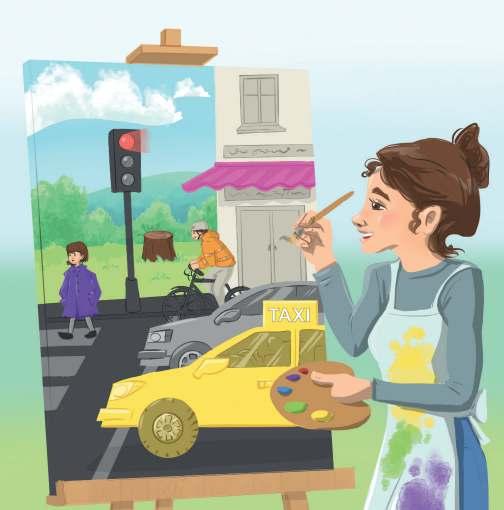

SPEAKING Work in pairs. Choose one of the words in Exercise 6 and spell it to your partner. He/She writes the word. Is he/she correct?






































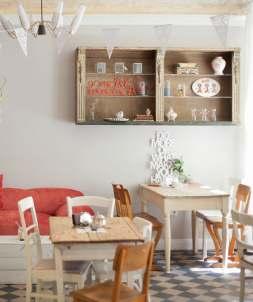

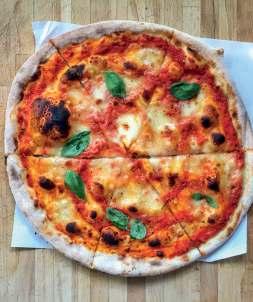










Herbert Puchta







Excerpt More Information





















































Cambridge University Press

978-1-009-15192-4
Herbert Puchta
4 W.04 Complete the dialogues with the words in the list. Listen and check.
Bye | Good | have | Hi | How | morning night | See you | thanks | this
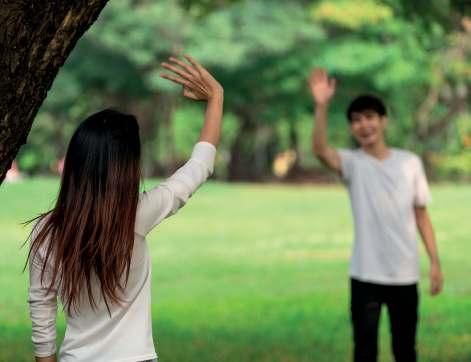

3
Leo Good 5 , Mr Williams.
Mr Williams Hello, Leo. How are you?
Leo I’m fine, thank you.
Mr Williams Good. I’ll see you in class.

Leo 6 , Mr Williams.
1
Carmen Hello. My name’s Carmen.
Felix Hi, Carmen. I’m Felix, and 0 this is Isabella.

Isabella 1 , Carmen.
Carmen Hi, Felix. Hi, Isabella.
4
Violet Bye, Ezra.
Ezra Bye, Violet. 7 later.
Violet Yeah, 8 a good day.
2
Harper 2 afternoon, Mrs Cortez.
Mrs Cortez Hi, Harper. 3 are you?
Harper Great, 4 . And you?
Mrs Cortez I’m fine, thanks.
5
Lucia Good 9 , Mum.
Mum Night, Lucia. Sleep well.
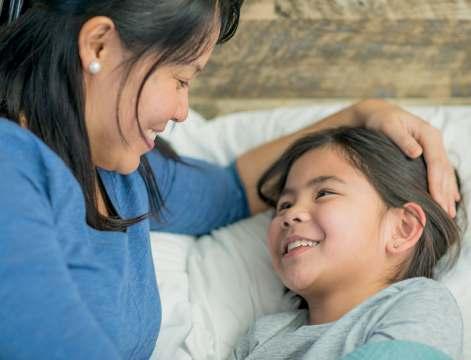
Cambridge University Press 978-1-009-15192-4 Think Starter Student's Book with Interactive eBook












































Herbert Puchta
Excerpt More Information


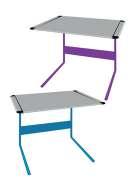





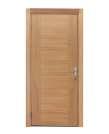
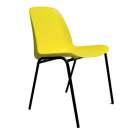
1 Look at the photos. Do you know these words? If not, ask your teacher: What’s … in English?
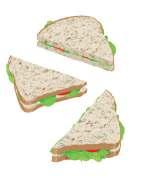
Numbers 0–20 6 W.06 Look at the numbers 0–20. Listen and repeat. 0 zero/‘oh’ 1 one 2 two 3 three 4 four 5 five 6 six 7 seven 8 eight 9 nine 10 ten

11 eleven 12 twelve 13 thirteen 14 fourteen 15 fifteen 16 sixteen 17 seventeen 18 eighteen 19 nineteen 20 twenty 7 SPEAKING Work in pairs. Choose three numbers from Exercise 6. Tell your partner to write them. Is he/she correct? 8 W.07 Listen and write the phone numbers you hear. 1 3 2 4 9 SPEAKING Work in pairs. What’s your favourite number? Compare. Plural nouns 10 Write the words and the numbers under the pictures. 2 W.05 Write the words in the list under the photos in Exercise 1. Listen, check and repeat. board | book | chair | computer | desk door | pen | pencil | projector | window 3 Do you know any other classroom objects? 4 SPEAKING Work in pairs. Point to the photos in Exercise 1. Ask and answer questions. What’s this in English? It’s a desk. 5 SPEAKING Work in pairs. Find things in your classroom and say the object and the colour. A black pen. An orange book.
nouns. Singular Plural 0 one man a three people 1 one woman b four men 2 one person c six children 3 one child d five women
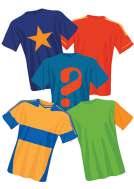

Cambridge University Press
978-1-009-15192-4 Think Starter Student's Book with Interactive eBook




Herbert Puchta
Excerpt
More Information

12 W.08 Listen and number the phrases in the order you hear them. Write 1–10 in the boxes.
13 W.09 Listen again and repeat.
a Open your books. f Sorry, I don’t understand.
b Listen! g That’s right.
c Put your hand up. h That’s wrong.
d Look at the picture. i Close your books.
e What does this mean?











j Work with a partner.

























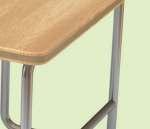









































8 Put the dialogues in order. Write 1–4 and 1–3 in the boxes.
1 Tom Great, thanks. And you?

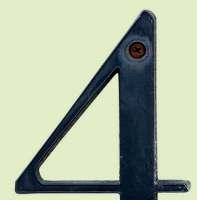








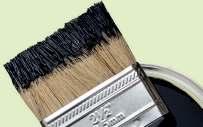


























1 Tom Good morning, Harry. Harry I’m fine, thanks.
Harry Hi, Tom. How are you?
2 Amy Yeah, have a good day. Amy Bye, Paul.
Paul Bye, Amy. See you later.
3 Dad Good night, Lars. Sleep well.
Dad It’s bedtime.
Lars OK. Good night, Dad.








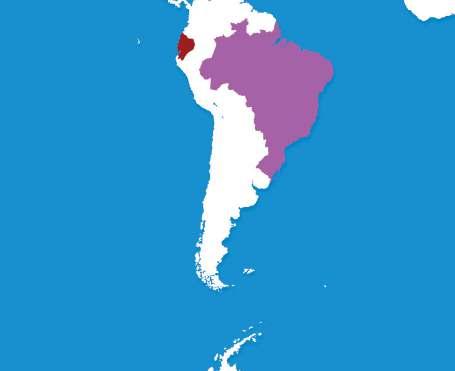





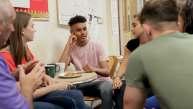
What’s your name? Cenc. Where are you from? I’m Turkish. I’m from a city called Izmir. How old are you? I’m ten.




















Who’s your favourite musician?
Ed Sheeran. He’s a singer and a guitar player. Why is he your favourite musician? Because he’s great!
What’s your name? I’m Flavia. Where are you from? I’m from Brazil. I live in Fortaleza. How old are you? I’m 11.





























Who are your favourite musicians?
Blackpink. They’re a girl group from South Korea. Why are they your favourite musicians? Because they’re great!


Don’t stop the music!
4 Choose a slogan for the website. One world together. Music is great. Sing, sing, sing!


What’s your name? My name is Jess. Where are you from? I’m British. I’m from Newcastle. How old are you? I’m 12.






Who’s your favourite musician?
Bruno Mars. He’s a singer from the US. Why is he your favourite musician? Because he’s awesome! What’s your name? My name is Li Jun. Where are you from? I’m from Indonesia. I live in Jakarta. How old are you? I’m 11.










Who’s your favourite musician? Yuja Wang. She’s a pianist from China. Why is she your favourite musician? Because she’s cool!

5 SPEAKING Work in pairs and compare your answers.


My slogan is ‘One world together.’ Mine is ‘Music is great.’
